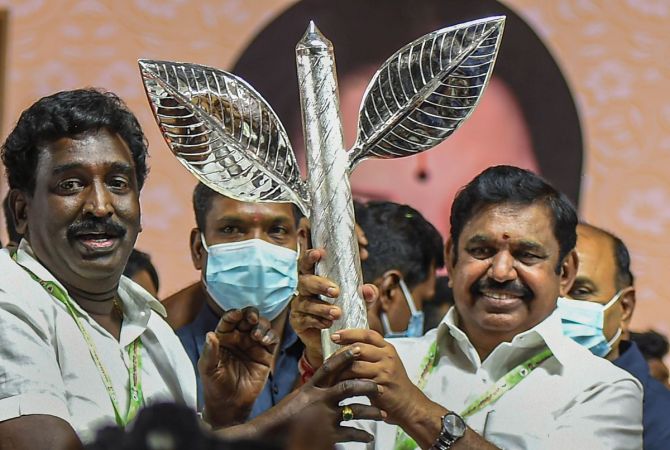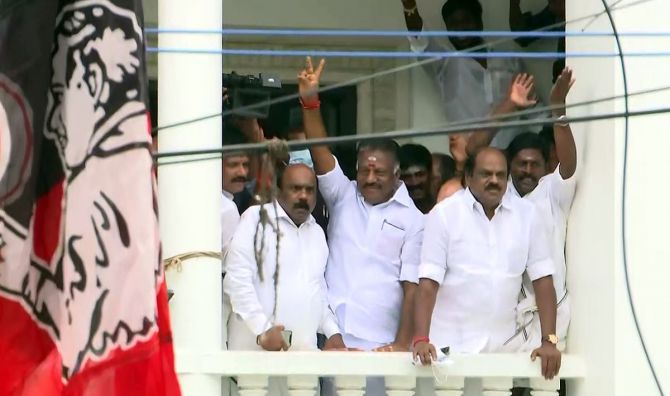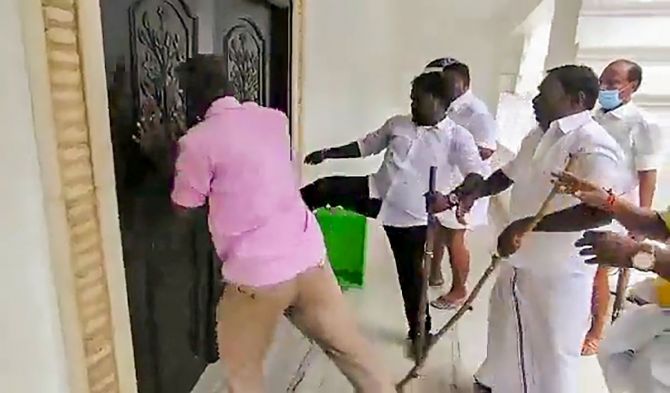There is nothing to suggest that the DMK stands to gain from the AIADMK split nor is there anything indicative of an extraordinary advantage for the BJP, independently or in the company of the AIADMK, explains N Sathiya Moorthy.

Now that the much-anticipated and intermittently delayed vertical split in the Opposition All India Anna Dravida Munnetra Kazhagam in Tamil Nadu has come through, questions have arisen about the party's electoral future and also that of the Bharatiya Janata Party ally in particular, given the latter's 'southern strategy' for the Lok Sabha polls of 2024.
These two years is also the time that the victorious Edappadi K Palaniswami (EPS) faction in the AIADMK has got to consolidate its hold and reach further and also clear legal hurdles that the defeated O Panneerselvam (OPS) camp has promised to place through the judiciary and the Election Commission.
It's also the time that EPS has got to ensure that he gets to retain the party brand and also the 'Two Leaves' election symbol, which loyalist voters identify still with AIADMK founder, the late M G Ramachandran, MGR for short.
The chances are that state revenue officials would remove the seals on the party office gates that they had implanted on Monday, July 11, only after the higher judiciary and the Election Commission, between them, clear all the legal and Constitutional issues that the OPS faction especially has promised to flag.
The list could include questions about the EPS-induced amendments to party bye-laws, removing former chief minister J Jayalalithaa as the 'eternal general secretary' and recreating the post after abolishing the shared posts of coordinator and joint coordinator, and also the 'undemocratic' provision that cancels out the membership of anyone who challenges the party/general secretary, as prevailing since inception.
Of course, as a byproduct, EPS's unilateral/unanimous selection as the interim general secretary until fresh elections four months hence, and mutual cancellation of the primary membership of both leaders.
In a way, it did not make sense for former chief minister Palaniswami, now Leader of the Opposition in the state assembly, to have rushed through the processes that he staged in the party general council, cleared to be held by the Madras high court only at the eleventh hour, on Monday, July 11.
It's all a huge comedown for OPS, a three-time chief minister, all for short spans, standing in for Jayalalithaa when law and health intervened -- and finally hours after her death in December 2016.
But the way he has mismanaged his case since then raises questions about his ability to manage a complex political set-up like the AIADMK and make it fighting fit against the rival DMK parent, now the ruling party.
Uncharitable criticism goes as far as to justify the over-ambitious faction led by then general secretary Sasikala Natarajan, Jaya's on-off live-in confidante, wanting to hijack the chief minister's job from OPS, after she had already been named general secretary in Jaya's name.
Despite being the all-powerful chief minister, he meekly surrendered without so far as to assert his governmental authority or even seeking time for 'consultation with his cabinet colleagues' -- and protested only as a delayed after-thought.
OPS's unsuspecting 'dharma yudham' at Jaya's memorial, which might not have dried enough, caught the imagination of the national media, but did not change the ground situation a wee bit.
Today, OPS will have all the time to muse over the wisdom of his not falling in line with Sasikala & Co at that crucial hour in his career without quitting, at least until he had stabilised, and counting instead too much on the ruling BJP ally at the Centre for deliverance.
Unlike OPS, who thought he alone was smart, EPS proved his prowess almost from the very minute Sasikala chose him as a 'substitute'. That was when acting governor Ch Vidyasagar Rao refused to swear her in as chief minister, pending the Supreme Court verdict in the disproportionate assets case against Jaya, in which she was a co-accused.
With Jaya, A-1 in the case, dead, Sasikala and two of her kin ended up cooling their heels in a Bengaluru prison, for four long years.

That was enough time for EPS to cultivate cabinet colleagues picked by Sasikala for him, the cadres and the BJP ally ruling the Centre, apart from patching up with OPS on the latter's unashamed return to the fold.
It was written all over that EPS was not going to stop with the newly created joint coordinator's job against OPS's coordinator position with the deputy chief minister's post tagged on for effect.
It mattered a lot then and since that through the AIADMK's twin defeats in the Lok Sabha poll of 2019 and the assembly election two years hence, EPS took care of his supporters at all levels, well and good, but OPS proved to be 'selfish'.
So much so, at every turn and at every instance, OPS was seen as sacrificing the interests of individual supporters, of whom there were not many at any point in time. He reportedly committed the cardinal sin of blocking the party's chances of joining the NDA government of Prime Minister Narendra Modi by insisting that his parliamentarian-son P Ravindranath should be named for the lone ministerial position on offer.
His downfall started there, but OPS was too busy to notice how the sand was slipping from under his feet, quick and fast.
There is truth in the reported claim by the EPS faction, for instance, that they had taken care of the election expenses of even the OPS camp followers through and through. Naturally, when the final showdown commenced this time round, OPS's native Theni district AIADMK unit was among the first to register their support for EPS.
To be fair to him, with more than adequate support from social media, EPS, as chief minister (2017-2021), won face and name recognition in every corner of the state, competing on equal terms with the DMK's Stalin, who is among the senior-most politicians in the country, having put in over 50 long years in politics.
That the EPS-OPS duo managed to lose two elections in a row, apart from a host of local bodies polls, before and after, still showed that there was the common voter whom Team EPS could not entice beyond a point.
On the day(s) of reckoning, the AIADMK lost, and so did EPS. Yet, he managed to stay afloat by fighting every inch, first to become Leader of the Opposition in the assembly, and now the party leadership. Past IOUs have helped him in a very big way.
The immediate question is if the AIADMK would survive the tumultuous transition, to remain fighting fit for the Lok Sabha polls of 2024.
Symbolically, in the golden jubilee year of the AIADMK's founding in 1972, state government authorities have been forced to lock the party office building from those early days, the first property founder MGR had purchased with his earnings as a film actor and which he had bequeathed to the party for the very purpose.
The EPS camp's whisper campaign, seeking to play on cadre sentiments, has blamed OPS for it, after the latter had 'occupied' the place with his musclemen, leading to fisticuffs, stone-throwing and bloody violence, even as the general council was meeting elsewhere in the city.
The EPS camp can be expected to blame OPS if the Election Commission were to freeze the Two Leaves symbol for the Lok Sabha polls -- but there is enough time for both the poll panel and the judiciary to dispose of related cases, when initiated, without having to delay it until the last minute-plus.
But, then, the EPS leadership would also have to be a little concerned about the added nuisance value that the Sasikala faction could add, especially if the latter were to join hands with OPS, as both had indicated ahead of the assembly polls last year.
It looks as if the EPS faction, including the man himself, seem to be petrified at the thought of facing Sasikala and working with her, they having disowned and discredited her when she was in prison, after benefiting immensely from her.
Indications are that a Sasikala-OPS alliance, if it came to that, too won't be able to challenge the EPS leadership, politically or legally.
Yet, EPS cannot escape the charge that he still remains a 'caste leader' of the influential Vellalar-Gounder community in the rich and prosperous western region, a strong AIADMK citadel from inception.
MGR was already a tall leader, and he ran a uniquely secular party at the lower levels, against the DMK's Karunanidhi, who was still finding his feet and was playing one caste against another, region-wise, district-wise. That was also the kind of politics Karunanidhi had grown up with, when the ruling Congress party had the late K Kamaraj doing precisely that in his time.

Jayalalithaa did not have the comfort when she inherited the party, though after an intervening break-up with MGR's widow, Janaki Ramachandran, the state's shortest-serving chief minister. She needed the caste-crutch that Sasikala's larger Mukkulathore community offered in the southern districts, and the political cunning of the latter's over-ambitious husband, the late M Natarajan.
Yet, once Jaya grew in stature and became assertive, she too ensured that every caste and community, spread across on regional basis, had its place and say in party affairs.
EPS is learning to do it, but naturally his confidants within the party and outside come from his community, his region -- or, it is so thus far.
For now, he has freely distributed top party positions to the Mukkulathore community representatives, to offset the Sasikala-OPS combo, jointly or severally, but that may not be enough, as it is more about caste sentiments of the martial community, which has yet to come to terms with the comedown, first of Sasikala and then of OPS, in a party which they had believed was theirs.
Where does the AIADMK go from here?
Ever since Jaya was hospitalised, the ruling BJP ally in the state has been working on the premise that in the absence of her tall leadership, they could make independent inroads, with hopes of leading the NDA combine in the state in the near future, with AIADMK playing second fiddle. Their convictions were reaffirmed when the DMK's Karunanidhi, ailing for a decade, passed away in March 2018.
Without the two top leaders, who were as competitive as they were charismatic in their distinct ways, the BJP came to believe that Tamil Nadu was up for grabs. The current AIADMK tussle has only revived their hopes that were sagging after the twin poll defeats in the combined AIADMK's company -- with other regional allies also to boot.
Facts speak otherwise. True, the two rival stalwarts of the Dravidian movement are no more there. But between them, Stalin and EPS have created a level-playing Dravidian field between themselves, leaving no space for a third party or leader to manoeuvre.
Through the years, the BJP is yet to produce a state-level leader who could measure up even this much. The BJP's pre-poll campaigns in the run-up to 2019 and 2022 did not cut much ice either with the AIADMK ally or with the larger constituency, despite Modi's larger-than-life image elsewhere in the country.
If anything, there is a strong section within the AIADMK that believes that their Lok Sabha poll loss owed to excessive identification with the BJP and the Modi leadership, that too after Jayalalithaa in her previous Lok Sabha poll outing in 2014 had won 37 of 39 seats from the state under the slogan, 'Modi-ya, indha lady-ya?'
The 2019 loss included EPS's western region, a traditional AIADMK stronghold.
In comparison, the party fared better in the region in the assembly polls, when EPS was projected as the chief minister candidate with OPS's endorsement, but only after another internal tussle.
The aggressive nature of the BJP's successive state unit presidents during the past years, namely, L Murugan, now a minister of state at the Centre, and K Annamalai, the incumbent who is an ex-IPS officer of the Karnataka cadre, has not cut much ice.
Annamalai's presentation of the urban civic body poll results across the state earlier this year may have impressed the unlettered in distant Delhi, but nearer home it is the Vanniar-strong Pattali Makkal Katchi that remains the third largest party, though a long way off from the Dravidian duo.
There is nothing to suggest that the Tamil voter mood has changed in any big way since 2019-2021, barring possible anti-incumbency that may affect the ruling DMK as it will the national counterpart in the BJP, the latter carrying the Hindutva baggage in a state that swears by secularism or 'pseudo-secularism' or whatever.
Rising prices, unemployment and the expected inauguration of the Ayodhya temple ahead of the 2024 polls can cut both ways for the BJP especially, but positivity is very limited.
The DMK in turn could be hurt by inevitable charges of corruption, with or without evidence, but to a lesser extent, depending on the continuing charisma that Stalin still may enjoy, however limited.
Dynasty politics, which the BJP wants to highlight across the country, is old wine in an old bottle as far as Tamil Nadu is concerned.
The reference is to frequent cadre appeal for Stalin giving greater responsibilities (meaning ministerial position) to his legislator-son Udhayanidhi, who is already the DMK youth wing chief, like his father in his time. But Stalin has ignored them all, and may be purposeful now that the BJP wants to revive the 'dynasty rule' charge against the DMK.
There is nothing to suggest that the DMK stands to gain from the AIADMK split nor is there anything indicative of an extraordinary advantage for the BJP, independently or in the company of the AIADMK and the rest.
Between now and 2024, the state BJP can become more aggressive vis-à-vis the DMK than already, as if there is an Opposition space for it to fill -- or, to bargain for a bigger piece of the cake vis a vis the AIADMK ally, with or without the latter's Two Leaves symbol.
N Sathiya Moorthy, veteran journalist and author, is a Chennai-based policy analyst and commentator.










